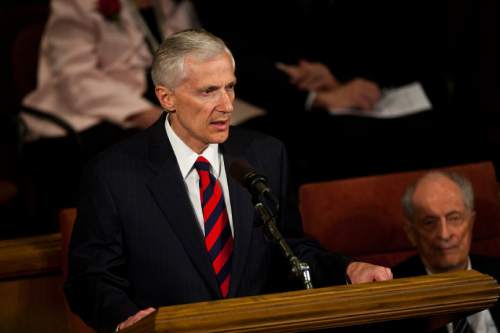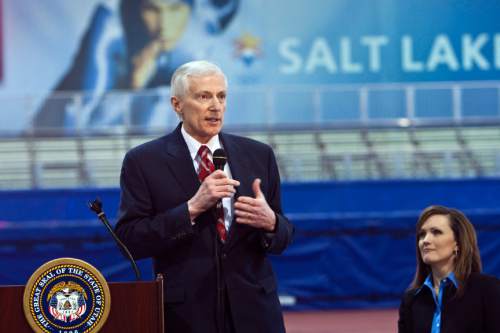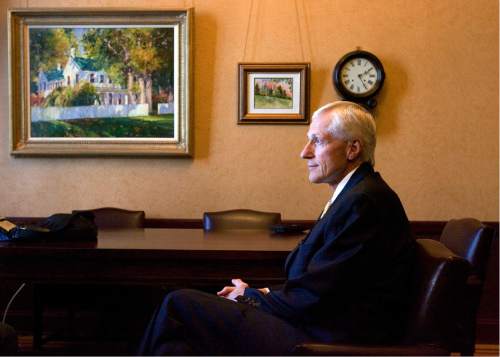This is an archived article that was published on sltrib.com in 2015, and information in the article may be outdated. It is provided only for personal research purposes and may not be reprinted.
The competing sides in the Utah Republican Party's court battle over changes to Utah's nominating process have chosen former Lt. Gov. Greg Bell to try to mediate a resolution to the lawsuit.
Earlier this month, U.S. District Judge David Nuffer urged attorneys for the GOP, the state and the Constitution Party to agree to a neutral party who could try to help hammer out a solution to the dispute over the way candidates are nominated for office.
While any settlement would not be binding — it would be up to the Legislature to change the law — Nuffer said a negotiated agreement would be more precise than if he is forced to rule on the case.
Meanwhile, the Utah attorney general's office has asked the judge to dismiss the case entirely, arguing that the parties haven't shown any evidence the law changing Utah's process for nominating candidates is unconstitutional.
"By requiring that qualified political parties hold a semiclosed direct primary, the state advances the compelling interests of reducing fraud and corruption and promoting a more democratic process of selecting candidates for public office," attorneys for the state said in a filing Monday.
SB54, passed by the Legislature in 2014 and due to be implemented next year, was the result of a deal struck with leaders of Count My Vote, an organization led by prominent Utah politicos including former Utah Gov. Mike Leavitt.
The group argued for doing away with Utah's traditional system of nominating candidates, wherein hopefuls court delegates chosen at neighborhood caucuses to win the spot on the ballot at the party's convention. Group members said it put too much power in the hands of a small group of party stalwarts, produced candidates that did not represent Utah's mainstream and did not adequately represent women.
After Count My Vote gathered signatures to put the changes on the ballot, the Legislature negotiated a hybrid nominating system, wherein candidates could seek a spot on the primary ballot by going to the party's nominating convention, or they could gather signatures from registered voters to land on the primary ballot, bypassing the delegate system.
The Republican Party and Constitution Party both sued, arguing that the Legislature effectively stripped the parties of the ability to decide for themselves who will be their standard-bearer on the ballot.
The case is on an expedited track through federal court, since changes need to be made in anticipation of the 2016 election. But Nuffer told the parties he hopes the impartial mediator could help them come to some resolution, short of forcing him to rule.
"I'm very happy to rule on things, but to the extent you cut short the litigation process by reaching agreement, you do everyone a great service," Nuffer said at the hearing earlier this month. "I get an ax, and you have pocket knives; and you could do a wonderful sculpture, and I just cut broadly."
Enter Bell, who served six years in the Utah Senate and four years as lieutenant governor under Gov. Gary Herbert — the named defendant in the lawsuit. As lieutenant governor, Bell led Utah's elections office. He is an attorney, developer and president of the Utah Hospital Association.
Details of the negotiations will not be made public. The parties agreed to have their first sit-down on either Sept. 30 or Oct. 1 and plan to meet again a week later.
If they do reach an agreement, it remains to be seen what would happen next. It would be up to the Legislature to make any changes to the law, and neither the attorney general's office nor the parties can force lawmakers to go along with the deal.
The Republican Party's attorney Marcus Mumford suggested at the hearing that Nuffer could issue an order directing the state to comply with the agreed-upon terms, but Nuffer expressed some reluctance to do so.
Twitter: @RobertGehrke







